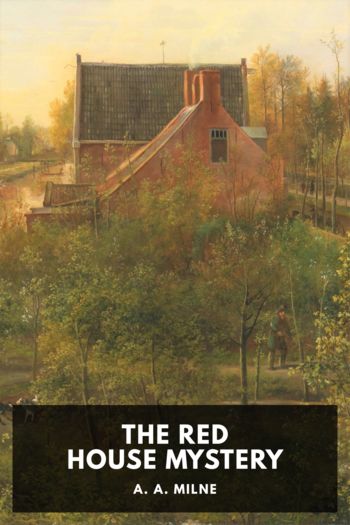Short Fiction - Edgar Allan Poe (book reader for pc .TXT) 📗

- Author: Edgar Allan Poe
Book online «Short Fiction - Edgar Allan Poe (book reader for pc .TXT) 📗». Author Edgar Allan Poe
Shall I then say that I longed with an earnest and consuming desire for the moment of Morella’s decease? I did; but the fragile spirit clung to its tenement of clay for many days—for many weeks and irksome months—until my tortured nerves obtained the mastery over my mind, and I grew furious through delay, and, with the heart of a fiend, cursed the days and the hours and the bitter moments, which seemed to lengthen and lengthen as her gentle life declined—like shadows in the dying of the day.
But one autumnal evening, when the winds lay still in heaven, Morella called me to her bedside. There was a dim mist over all the earth, and a warm glow upon the waters, and amid the rich October leaves of the forest, a rainbow from the firmament had surely fallen.
“It is a day of days,” she said, as I approached; “a day of all days either to live or die. It is a fair day for the sons of earth and life—ah, more fair for the daughters of heaven and death!”
I kissed her forehead, and she continued:
“I am dying, yet shall I live.”
“Morella!”
“The days have never been when thou couldst love me—but her whom in life thou didst abhor, in death thou shalt adore.”
“Morella!”
“I repeat that I am dying. But within me is a pledge of that affection—ah, how little!—which thou didst feel for me, Morella. And when my spirit departs shall the child live—thy child and mine, Morella’s. But thy days shall be days of sorrow—that sorrow which is the most lasting of impressions, as the cypress is the most enduring of trees. For the hours of thy happiness are over and joy is not gathered twice in a life, as the roses of Paestum twice in a year. Thou shalt no longer, then, play the Teian with time, but, being ignorant of the myrtle and the vine, thou shalt bear about with thee thy shroud on the earth, as do the Moslemin at Mecca.”
“Morella!” I cried, “Morella! how knowest thou this?” but she turned away her face upon the pillow and a slight tremor coming over her limbs, she thus died, and I heard her voice no more.
Yet, as she had foretold, her child, to which in dying she had given birth, which breathed not until the mother breathed no more, her child, a daughter, lived. And she grew strangely in stature and intellect, and was the perfect resemblance of her who had departed, and I loved her with a love more fervent than I had believed it possible to feel for any denizen of earth.
But, erelong, the heaven of this pure affection became darkened, and gloom, and horror, and grief swept over it in clouds. I said the child grew strangely in stature and intelligence. Strange, indeed, was her rapid increase in bodily size—but terrible, oh! terrible were the tumultuous thoughts which crowded upon me while watching the development of her mental being. Could it be otherwise, when I daily discovered in the conceptions of the child the adult powers and faculties of the woman?—when the lessons of experience fell from the lips of infancy? and when the wisdom or the passions of maturity I found hourly gleaming from its full and speculative eye? When, I say, all this became evident to my appalled senses—when I could no longer hide it from my soul, nor throw it off from those perceptions which trembled to receive it—is it to be wondered at that suspicions, of a nature fearful and exciting, crept in upon my spirit, or that my thoughts fell back aghast upon the wild tales and thrilling theories of the entombed Morella? I snatched from the scrutiny of the world a being whom destiny compelled me to adore, and in the rigorous seclusion of my home, watched with an agonizing anxiety over all which concerned the beloved.
And as years rolled away, and I gazed day after day upon her holy, and mild, and eloquent face, and poured over her maturing form, day after day did I discover new points of resemblance in the child to her mother, the melancholy and the dead. And hourly grew darker these shadows of similitude, and more full, and more definite, and more perplexing, and more hideously terrible in their aspect. For that her smile was like her mother’s I could bear; but then I shuddered at its too perfect identity—that her eyes were like Morella’s I could endure; but then they, too, often looked down into the depths of my soul with Morella’s own intense and bewildering meaning. And in the contour of the high forehead, and in the ringlets of the silken hair, and in the wan fingers which buried themselves therein, and in the sad musical tones of her speech, and above all—oh! above all—in the phrases and expressions of the dead on the lips of the loved and the living, I found food for consuming thought and horror—for a worm that would not die.
Thus passed away two lustra of her life, and as yet my daughter remained nameless upon the earth. “My child,” and “my love,” were the designations usually prompted by a father’s affection, and the rigid seclusion of her days precluded all other intercourse. Morella’s name died with her at her death. Of the mother I had never spoken to the daughter;—it was impossible to speak. Indeed, during the brief period of her existence, the latter had received no impressions from





Comments (0)